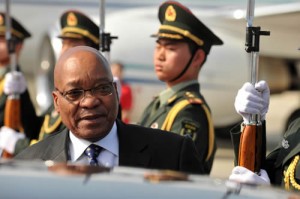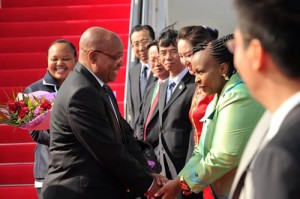
Zuma: shared prosperity for all
The third summit of the BRICS (Brazil, Russia, India, China and South Africa) group of emerging nations takes place in China on 14 and 15 April under the theme Broad Vision, Shared Prosperity. South Africa’s President Jacob Zuma, representing the country for the first time at the invitation of his Chinese counterpart Hu Jintao, addressed […]


South Africa’s President Jacob Zuma, representing the country for the first time at the invitation of his Chinese counterpart Hu Jintao, addressed a plenary session on 14 April.
Zuma thanked the other members of the bloc, saying that South Africa was proud to be a member of the new world order.
The full text of his speech follows below:

I wish to acknowledge with deep gratitude the personal efforts made by the distinguished leaders present here, to expedite South Africa’s membership of BRICS.
Your various messages of congratulations and official statements on South Africa’s membership have been humbly but proudly received by the South African government and people. I thank you sincerely for this exceptional welcome into your midst.
It may be recalled that just two decades ago, South Africa was still in the throes of its liberation struggle. Brazil, the Russian Federation, India and China firmly supported our quest for freedom. Today we have met as one, we have met as partners.
This bears testimony to the evolving world. We are now equal co-architects of a new equitable international system.
Such a new world order will be to the benefit of all humanity and aims at securing shared prosperity for all.
What distinguishes each of the BRICS countries is the value and importance we attach to development.
We share the commitment of ensuring that our people benefit at the broadest level from global growth and that the benefits of economic expansion are shared equitably.
South Africa and the African continent’s future prosperity is increasingly linked to the economies of BRICS, and this forum can decisively assist in tackling our development deficits.
As you are aware, the BRICS countries in general have a large savings pool whereas the African continent is ready for large scale investments, particularly in infrastructure and manufacturing.
Over the next ten years, Africa will need US$480-billion (R3.3-trillion) for infrastructure development, which should interest the BRICS business communities.
Already, Africa is projected as the third fastest growing economy in the world, while the BRICS countries now constitute the largest trading partners of Africa and largest new investors.
This economic relationship will be further strengthened as Africa forges ahead towards regional economic integration. This move will open up opportunities for more foreign direct investment and expanding trade relations with BRICS countries.
With regards to South Africa specifically, we expect to benefit economically and politically from this important alliance.
Our primary goal is to improve the lives of South Africans through the growth and development of the economy, which will in turn result in job creation, our primary focus areas especially this year.
South Africa stands to benefit from the concrete projects of BRICS. These are in areas such as agriculture, science, statistics, development finance institutions, security and justice.
As this is a dynamic relationship, more areas of cooperation will no doubt be added as we interact.
We must emphasise that the relationship with our BRICS partners does not mean that relations with countries such as the US and the broader North have become less important.
The European Union and Europe also remain South Africa’s most important economic trading partners, accounting for approximately 40% of its exports, as well as 70% of foreign direct investment.
We value these relationships with the developed North too.
We recognise the developed North’s continued dominance, but it is important to also acknowledge the rising importance of the giants of the South and the value thereof, for a developing economy like ours.
Excellencies, ladies and gentlemen,
As you are aware, the African Union (AU) has put forward a road map towards a viable political solution to the Libyan situation.
The roadmap calls, amongst others, for the cessation of all hostilities, implementation of political reforms to eliminate the causes of the current crisis, and an inclusive dialogue among the Libyan parties.
While Libyan Leader Colonel Muammar Gaddafi accepted the road map and has agreed to work with the AU towards a solution, we must still work further with the opposition groups to gain their understanding and cooperation.
We appreciate the support of the BRICS countries of this AU initiative.
With regards to Cote d’Ivoire, the AU had taken a position that the recognised winner of the elections, Mr Alassane Ouattara, should be given an opportunity to lead the country.
It is important that work begins without delay towards normalising the situation and to unite the Ivorian people.
Excellencies, ladies and gentlemen,
At the end of this year, South Africa will host the 17th Conference of Parties (COP) meeting of the UN Framework Convention on Climate Change.
We are working towards the implementation of the COP 16 decisions in Durban, and are aiming for a realistic outcome in the short time available, while not raising any unrealistic expectations.
We firmly support an equitable and legally binding outcome to be reached by parties participating in the climate change negotiations.
I also have the honour to co-chair, with Her Excellency Tarja Halonen, the President of Finland, the UN secretary-general’s High Level Panel on Global Sustainability.
We have no choice as nations of the world. We must confront the climate change challenge head on for the sake of sustainable development and future generations.
Ladies and gentlemen,
With regards to equitable international trade, we join the call for the conclusion of the Doha Development Round, and will continue engaging for a developmental round.
Excellencies, ladies and gentlemen,
We are optimistic about progress in many areas of cooperation, because we in BRICS share a common view on the need to work together to change the world for the better.
There is unity of purpose in our diversity and this is what renders this mechanism unique and increasingly influential.
Naturally each country is responsible to its own citizenry, but we further share a collective accountability now to the global community and notably the emerging market and developing economies component thereof.
Once again, let me reiterate the honour of the Republic of South Africa and its people on becoming a member of this important group of countries.
I thank you.
Source: The Presidency
